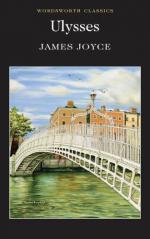Flatter. Rarely. But flatter.
—Himself his own father, Sonmulligan told himself. Wait. I am big with child. I have an unborn child in my brain. Pallas Athena! A play! The play’s the thing! Let me parturiate!
He clasped his paunchbrow with both birthaiding hands.
—As for his family, Stephen said, his mother’s name lives in the forest of Arden. Her death brought from him the scene with Volumnia in Coriolanus. His boyson’s death is the deathscene of young Arthur in king John. Hamlet, the black prince, is Hamnet Shakespeare. Who the girls in the tempest, in Pericles, in winter’s tale are we know. Who Cleopatra, fleshpot of Egypt, and Cressid and Venus are we may guess. But there is another member of his family who is recorded.
—The plot thickens, John Eglinton said.
The quaker librarian, quaking, tiptoed in, quake, his mask, quake, with haste, quake, quack.
Door closed. Cell. Day.
They list. Three. They.
I you he they.
Come, mess.
Stephen: He had three brothers, Gilbert, Edmund, Richard. Gilbert in his old age told some cavaliers he got a pass for nowt from Maister Gatherer one time mass he did and he seen his brud Maister Wull the playwriter up in Lunnon in a wrastling play wud a man on’s back. The playhouse sausage filled Gilbert’s soul. He is nowhere: but an Edmund and a Richard are recorded in the works of sweet William.
MAGEEGLINJOHN: Names! What’s in a name?
Best: That is my name, Richard, don’t you know. I hope you are going to say a good word for Richard, don’t you know, for my sake.
(Laughter)
BUCKMULLIGAN: (PIANO, DIMINUENDO)
Then outspoke medical Dick
To his comrade medical Davy ...
Stephen: In his trinity of black Wills, the villain shakebags, Iago, Richard Crookback, Edmund in king Lear, two bear the wicked uncles’ names. Nay, that last play was written or being written while his brother Edmund lay dying in Southwark.
Best: I hope Edmund is going to catch it. I don’t want Richard, my name ...
(Laughter)
QUAKERLYSTER: (A tempo) But he that filches from me my good name ...
Stephen: (Stringendo) He has hidden his own name, a fair name, William, in the plays, a super here, a clown there, as a painter of old Italy set his face in a dark corner of his canvas. He has revealed it in the sonnets where there is Will in overplus. Like John o’Gaunt his name is dear to him, as dear as the coat and crest he toadied for, on a bend sable a spear or steeled argent, honorificabilitudinitatibus, dearer than his glory of greatest shakescene in the country. What’s in a name? That is what we ask ourselves in childhood when we write the




